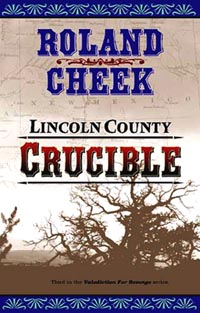a weblog sharing info on outdoor skills and campfire musing by a guy who spends a bunch of time in pursuit of both
CULTURE
WHERE -
TALES ARE TOLD OF
Welcome to Roland Cheek's Weblog
Roland is a gifted writer with a knack for clarifying reality. Looking forward to more of his wisdom
- Carl Hanner e-mail
In many locales throughout America, evidence is overwhelming that a place in the throes of an energy boom differs little from a person in the grip of an addiction: First comes denial that things can get out of control; then denial that things are out of control. Moral loosening follows, leading to public carelessness and even individual bewilderment. Finally there's understanding that you're doing something you know isn't good for you, but there's no way you can stop. For persuasive examples, take a quick run through the East's Appalachian coal regions or the West's "oil patches."
To access Roland's weblog and column archives
Tip o' the Day
Last week in this "Tips" column, we discussed some of the physical considerations for one to successfully visit the Bob Marshall Wilderness. We did, however, run out of time before we could get to a planner's own personal constraints.
Physical considerations included dangerous water crossings, rules for using perilous trails, usual opening dates for the high passes, best viewing times for wildlife and wildflowers, prime fishing time, getting away from other people, finding awe-inspiring scenic grandeur, etc.
Now let's talk about one's own personal constraints:
First and foremost is vacation time. I'm talking about your own vacation, but you might well have to consider your accompanying friends' vacation periods, too.
Or perhaps it's when your children's grandparents might be available to babysit. Or when the company merger is scheduled to go through. Or when the wife graduates from advanced nursing training.
You get the drift, right? Many (or most) people are locked into opportunity parameters over which they have little control. They must visit the Bob Marshall Wilderness during certain periods . . . period! When one is constrained by time, certain personal needs and desires must usually take a subordinate planning position.
An example might be that an early June vacation simply does not allow travel through most of the high passes, nor is it the best time for fishing the main rivers.
Unfortunately, many people cannot--or will not--recognize the realities of their vacation time constraints. As a consequence, their planning suffers, and so does their adventure.
Then there are the dreamers--may God bless them because Roland won't. They're the ones who try to fit a place as grand as the Bob Marshall into their own tiny little square-block mode; like the magnolia-dripping New Orleans belle who said, "I want to see everything there is to see in the Bob Marshall Wilderness." Then she told me she could spare three days from her hectic schedule!
Roland's Popular Valediction For Revenge Western Adventure Series
SOCIAL COSTS OF BOOMTOWN DEVELOPMENT
I disagree with Samuel Johnson, foremost man of English literature during the American Revolution, who was quoted as saying: Anyone who writes for any reason other than to make money is a blockhead.
Perhaps I could view Sam's perspicuity more positively if I believed it -- but I don't. In my view, the only justifiable reason for writing anything is to provide information. To me, though I'm very much in favor of making money, the profit motive is secondary to whether what I write is worthwhile. A money-making article without informational value should, in my view, be printed on toilet paper instead of slick magazine stock, whereas a piece conveying critical information provides good stuff whether the writer was adequately paid or received nothing.
Carrying this theme further, I do not like to read any kind of stuff that is uninformative. Having said that, I'll confound you by saying that I enjoy good humor -- even comic strips in the newspapers. Why? Because well done humor pieces and comic strips convey a particular point of view or an intriguing writing style. In other words, simply because humor or cartoons invoke a good chuckle doesn't mean they're devoid of information. (If you still don't understand, then you should go back and take a second look at "Peanuts," "B.C." or "Pogo" to grasp their undercurrents of worthwhile wisdom.)
An excellent example of the kind of article that gives me pause to think was in the Feb. 5, 2007 issue of The New Yorker magazine titled "Boomtown Blues," about mushrooming oil and gas development in Sublette County, Wyoming.
Jane and I often pass through Sublette County on our travels through Wyoming, and we more often than not scratch our heads at the apparent growth and prosperity amid an arid sagebrush and alkali region. Obviously the proliferation of night-lit drill rigs and working rocker pumps provided the prosperity angle. But it took the New Yorker article to explain its social cost.
We might've had an inkling of a few of those costs by the amount of roadside refuse, haphazard town sprawl, and all-hours traffic by mudded-up SUVs and pickup trucks. But what was beyond our ken was the plethora of bar brawls and an exploding use of methamphetamine and other drugs by both newcomers and old-timers. Or the social disruptions lying beneath the surface to casual passers-by, such as a rising crime rate against the backdrop of a declining ranching culture.
Alexandra Fuller, who wrote the New Yorker story quoted one Sublette County cowgirl as saying most of the relatives and friends she had while growing up are either "out on the oil patch, out of state, or in the Rawlins State Penitentiary."
Alexandra Fuller quoted rancher Freddie Bofur as saying: "Energy is the dominant culture now. We're getting steamrolled by industry." Bofur, who owns the surface rights to his land -- but not the mineral rights -- said, "They're going after everything. The impact on this kind of land, with our slow growing season and thin soils, is essentialy irreparable."
Each well, according to the article, takes up three acres of land, but that doesn't include the incidental development of roads, water treatment facilities, pipelines, and housing for rig workers. The story added that in the past six years, requirements for rig spacing have been downsized from 80 acres to as few as ten. Translated, that means parts of Sublette County are, in essence, given over entirely to oil and gas development.
What about Sublette County's huge mule deer and antelope populations? According to Fuller's research: "Since 2000, there has been a forty-six percent decline in mule deer populations."
Where am I going with this? Well, reading about and actually experiencing Sublette County, Wyoming suggests a parallel between its hydrocarbon reserves and that claimed beneath Montana's Rocky Mountain Front. Despite the probable view of developers that the Front's resources are being "wasted" in order to show preference for wildlife, as well as providing aesthetic views from a few farmers and ranchers living room windows, most Montanans can breath a sigh of relief that we narrowly avoided the bullet of our own kind of Sublette County's oil patch . . . for now.
Thanks to the unstinting, never flagging efforts of a few folks, legions of Montanans were educated to understand the one-of-a-kind natural values residing in the Front, and they in turn got the word out to armies of people across America.
Of those tireless protectors of the Front, none proved more dedicated than Gene Sentz, a quiet unassuming, retired schoolteacher and sometimes wilderness packer from Choteau.
Roland Cheek wrote a syndicated outdoors column (Wild Trails and Tall Tales) for 21 years. The column was carried in 17 daily and weekly newspapers in two states. In addition, he scripted and broadcast a daily radio show (Trails to Outdoor Adventure) that aired on 75 stations from the Atlantic seaboard to the Pacific Ocean. He's also written upwards of 200 magazine articles and 12 fiction and nonfiction books. For more on Roland, visit:
www.rolandcheek.com
Recent Weblogs
Tuesday, January 22, 2008
There's a bunch of specific info about Roland's books, columns, radio programs and archives. By clicking on the button to the left, one can see Roland's synopsis of each book, read reviews, and even access the first chapter of each of his titles. With Roland's books, there's no reason to buy a "pig in a poke."
for detailed info about each of Roland's books
Read Reviews
Read their first chapters
For interested educators, this weblog is especially applicable for use in history, environmental, and government classes, as well as for journalism students.
Roland, of course, visits schools. For more information on his program alternatives, go to:
NEXT WEEK:
WAR IS HELL
www.campfireculture.com
source links for additional info
to send this weblog to a friend
Please Click Here
to tell Roland what you think of his Campfire Culture weblog
to visit Roland's newspaper columns and weblog archives
Click Here For Detailed Info About All Roland Cheek Books
The Valediction For Revenge Western Adventure series: Six novels chronicalling the life of Jethro Spring, the mixed-race progeny of a mountain man father and a Blackfeet mother; stories of desperate struggles to play the cards fate dealt amid the pages of history.
Award-winning Western writer Richard Wheeler says of Roland's novels:
Like Louis L'Amour, Roland Cheek knows how to start a story at a gallop and hold the reader to the last page. He writes richly and authentically about the Old West, drawing from an encyclopedic knowledge of his subject.
* * *
The Tulsa World had this to say of Lincoln County Crucible, the conclusion of Roland's two Lincoln County sagas:
Roland Cheek has used the history of the Lincoln County War and gives it a fresh twist. The dialogue is extremely well-done and the action scenes are alive with excitement.








